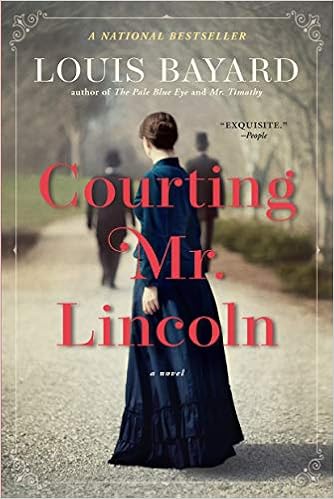Set in Springfield, Illinois in the 1840s, this book fictionalizes the romance between Abraham Lincoln and Mary Todd, his future wife, and the friendship between him and Joshua Speed, a merchant and Lincoln’s landlord and bedmate. Speed finds his purpose in life in educating Lincoln on how to be a gentleman; he teaches him etiquette and how to dress properly. Tensions arise between the two when Lincoln meets Mary and begins courting her. The courtship has a number of problems, some of which are instigated by Speed because he sees Mary as a rival for Lincoln’s affections.
The narrative alternates between Mary and Speed’s points of view. This technique fills in gaps. For instance, Mary is sometimes confused
about Lincoln’s behaviour; Speed’s perspective then explains what Mary doesn’t
know. I found Speed’s sections more compelling. His interactions with Lincoln are natural and
relaxed whereas Mary and Lincoln’s relationship lacks that ease, though much of
the awkwardness can be attributed to the constraints of acceptable behaviour
between the sexes.
What emerges is a complex portrait of Lincoln as seen by two people who
love him. Speed describes him as someone
“with not a scrap of affectation or unnaturalness in him. He is purely what he is and thinks more
deeply, more searchingly than anybody I know.”
When Mary first meets Lincoln, she sees “An El Greco frame, stretched
beyond sufferance. A mournful well of
eye. A face of bones, all badgering to break through.” He is not her romantic ideal, but she becomes
interested and then fascinated, though Lincoln is insecure because of his
background and feels unworthy of Mary.
In his interactions with both people, Lincoln shows himself to be
intelligent, determined, and compassionate.
In the end, it is a supporter’s description that perhaps best describes
the future president: “a great man –
large of mind and large of soul.”
Speed and Mary also emerge as fully developed characters. Speed is witty and charming, the life of
parties. He recognizes the potential in
the awkward, unpolished man he first meets, though he does not always
understand himself very well. He takes
actions, like informing on Mary to her sister, without fully understanding his
motivation. Mary is intelligent and
opinionated, especially about politics which are her passion. Because of her spirited nature, she struggles
with the restrictions placed on her because of her gender.
I loved the elegant prose. In
many ways, it reminded me of that of Jane Austen. The dialogue is also similar; much is left
unsaid. There is much humour in the
conversational exchanges, especially between Speed and Lincoln. The dance and etiquette lessons are
hilarious.
I really enjoyed the book. My
only regret is that my knowledge of the American political system is lacking. Not being American, I don’t know much about
the Whig party and the various politicians mentioned in the novel; as a result,
many of the political discussions meant little to me. Based on what I do know about Lincoln, the
novel’s portrayal seems historically accurate. I am inspired to read more about Mary Todd to
compare this fictional representation with her historical record.
Note: I received a digital
galley from the publisher prior to the book’s paperback release on Feb. 11.

No comments:
Post a Comment